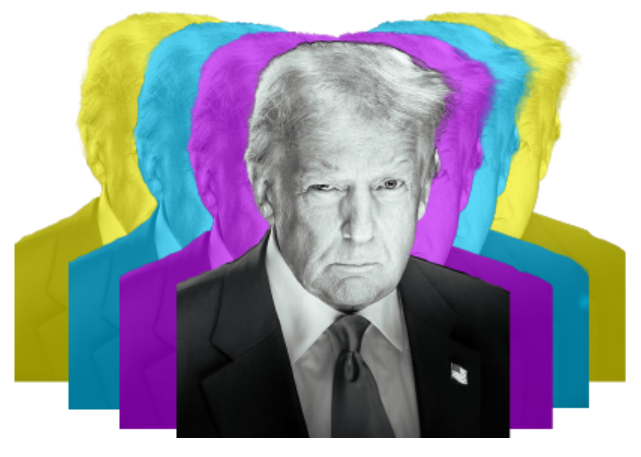The United States has been known as a global superpower for over a decade, assuming a peacekeeping role on the world stage. But since the second inauguration of President Donald Trump and his “America First” legislation, U.S. foreign policies have changed.
When compared with other administrations, Trump’s view of tariffs shifts from their traditional use. Tariffs are taxes on imported goods. Everyday goods are subject to tariffs: clothes, electronics, cars and even food. Trump, in his effort to deliver on his campaign promise to lower taxes, has used tariffs to subsidize the loss of revenue.
“The tariffs and the constant on again off again have created an economic unease among people in the United States,” social studies teacher Jessica McNally said. “A lot of countries have re-thought their alliances with the United States during this time. We do risk losing some of our best allies.”
Currently, Trump has threatened rates as high as 200%. However, many of these tariffs are just that: threats. The term TACO (“Trump Always Chickens Out¨) was first used by the Financial Times to describe Trump’s tariff policies. On many occasions, he has threatened a tariff only to reverse or delay the decision before the tariff was enforced.
According to Reuters, Prime Minister Anthony Albanese of Australia said “the [Trump] administration’s tariffs have no basis in logic, and they go against the basis of our two nations’ partnership.”
And while tariffs have been a staple of Trump’s current policies, the peacekeeping goals of the U.S. have led to efforts to end Russia’s war in Ukraine and Israel’s war in Gaza.
Despite his campaign promises, Trump has been unable to broker a lasting ceasefire and end the ongoing humanitarian crisis in Gaza. National and worldwide pressure to end the war has led top White House officials to make plans for post-war Gaza and put pressure on Israel to stop the fighting.
According to Al Jazeera, Trump has gone as far as to suggest the United States “take-over” and “own” Gaza and relocate the Palestinians, but he faced international backlash for the comment.
While he has focused on getting food into Gaza, Trump told reporters, “As far as the rest of it, I really can’t say. That’s going to be pretty much up to Israel.”
Trump’s policies have made headlines internationally, with many people worried about what his decisions mean for them.
“I personally love to travel,” McNally said. “I don’t want to go somewhere and be embarrassed to be an American and feel like people in different countries are looking down on Americans.”
McNally’s fears have become a reality for some Americans abroad.
Senior Syarah Schatz is spending the year studying in Germany and has observed what Germans tend to think about life in America.
“Germans think America is in a really bad state right now,” Schatz said.
Not only might U.S. actions on the world stage worry citizens, but so too can words expressed in public settings.
“Germans felt very hurt when Elon Musk supported the Alternative for Germany (AfD) party,” Schatz said. “It feels like it’s repeating history a little bit.”
According to research from National Public Radio (NPR), AfD is Germany’s ultra-right political party that is currently under federal German surveillance for suspected extremism. Elon Musk, the former U.S. special government employee, supported the party during during an AfD rally in January, indicating that Germans need to “move beyond” their troubled history.
During his time in the administration, Musk cut crucial programs for immigrants in America, including legal services for unaccompanied children, refugee and entrant assistance, and the U.S. Citizenship and Immigration Services (USCIS) grant program.
Senior Arianna Rudey, a daughter of Moldovan and Ukrainian immigrants, noted that “it’s so different when you grow up in America because you’re so used to all the rules and you’re used to everything. But to immigrants, it’s so completely different because you’re not used to American rules. You’re not used to any of that.”
Cultural differences also change how non-Americans perceive the U.S. Discerning whether social media platforms and politicians accurately depict a country’s identity can be a struggle.
“Germans think Americans are loud, definitely. Lazy, fast-food loving,” Schatz said, before adding the common German thought that Americans are “obsessed with McDonald’s.”
Outsiders are not only noticing cultural differences, but also different approaches to diplomacy and global politics.
Recently, Trump met with Russian President Vladimir Putin to discuss the potential for a Russia-Ukraine ceasefire. The three-year-old conflict has reached a death toll of over 1 million people with no peace deal in place.
“I know my mom is panicking,” Rudey said.
Leading up to his presidency, Trump said he would end the war in Ukraine within his first 30 days in office. In his first month, he temporarily froze military support to Ukraine. In February, Trump and Ukrainian President Volodymyr Zelenskyy met to discuss the challenges Ukraine was facing, but the meeting ended with heated words and little progress. In August, Trump met with Putin in Alaska to continue negotiations, notably excluding Zelenskyy. No peace agreement was met, leading Trump’s promise of a ceasefire to fall short.













